Charging an EV battery is different from refueling a gasoline tank. This process involves a large amount of electricity transfer to the batteries. Hence EV chargers are specifically designed by keeping various factors in mind, which are discussed below.
Amperage: Amperage determines the maximum current carrying capacity of a charger. Since a battery draws electricity only up to the set limit, a charge must provide amperage which matches this limit. If charger amperage is rated higher, the battery will still utilize allowable amperage. But problems arise when the charger amperage is lower than the battery’s amperage rating. Hence a charger capable of providing a wide amperage rating is always considered. Charger level: EV chargers are classified into 3 different levels. The levels determine the charging speed of the charger since it indicates the amount of power delivery. The Level 1 and level 2 chargers work on alternating current (AC). The level 3 chargers are different since they use direct current (DC). Cable length: Cable length is important in the EV chargers for many reasons. Longer cables offer connectivity when the input and output sources are distant from each other. The length also determines the resistance offered to the electrical flow. This problem arises in the lower quality cables where wire cores are not designed properly.
When buying an EV charger, these factors matter a lot. Your charging experience should never suffer due to a low-performing charger. Hence many manufacturers have been developing chargers that can keep up with the ever-changing EV market. To help you choose the right charger, we have provided a detailed “Buying Guide”. We have also listed all the available chargers for EVs, along with their details. This will help you narrow down the best charger for your EVs.
Best EV Charger
Best EV Charger Reviews
1. Grizzl-E EV Charger
Grizzl-E is one of the organizations which quickly adapted to the EV market. With one goal of providing an affordable charging solution for all EVs, this brand has been constantly developing chargers that competitively influence the market.
Best Group 35 Batteries Best AGM Battery Charger Best Golf Cart Battery Best CPAP Batteries How long do AGM Batteries last? Best AGM Batteries
The Grizzl-E Avalanche 14-24-PB is a level 2 charger. This charger comes with adjustable amperage from 16A to 40A which is 80% of the actual amperage rating. This ensures no overloading occurs through the charger and gives a wider choice of output. The charging rate is also adjustable from 10 miles an hour to 30 miles an hour. The charger is UL certified which means it has been tested for rigorous conditions, resulting in safer operations. The IP67 rating for water resistance, fire resistance, temperature monitoring, etc. adds to the safety of the charger. A built-in GFCI circuit breaker keeps the user from getting electrocuted. The cable length is 24 feet long with a 14-50 NEMA standard plug which suits normal 14-50R outlets. This charger comes with an aluminum bracket for easy mounting on the wall. The charger body is sturdy and water resistant. Best Features:
Classifies as a level 2 EV charger Adjustable amperage of 16 A to 40A with a maximum amperage rating of 50A A longer 24 feet premium cable with a standard 14-50 NEMA plug Charging rate of 12 to 30 miles an hour, depending on the battery capacity Built-in GFCI circuit breaker IP67 water resistance and fire resistant Aluminum mounting bracket
Pros:
Various safety features to keep the charger and the user away from electrocution-related hazards Compact in size and built quality is robust Compatible with most EVs and plug-in hybrid EVs Can be operated in any climate
Cons:
A bit heavier than the competitors
2. ChargePoint EV Charger
ChargePoint has been working on expanding its charging networks for EVs. To assist these programs, they have also introduced charging solutions for EVs. Blanding hardware and cloud service, their smart charging is catering to a wider consumer now. The ChargePoint Home Flex Electric Vehicle Charger is a fast charger that works on a 240 Volt circuit line and hence qualifies as a level 2 charger. It has an adjustable charging amperage setting from 16 to 50A that can be controlled by an app. The charging speed hence becomes adjustable as per the capacity of the EV battery. A maximum of 37 miles per hour can be added through charging. The charging cable is 23 feet long and comes with a standard NEMA 6-50 plug. This plug is easy to remove for upgrading into a higher amperage setting. Charging schedules can be set with the remainder as this charger can accept inputs through the Alexa voice command. Best Features:
A 240 Volt, level 2 EV charger Adjustable amperage from 16 to 50A 23 feet long cable with NEMA 6-50 plug Voice controlled commands Weatherproof body
Pros:
Certified with Energy Star and hence efficient than other chargers Safe to use since the charger is UL listed, tested for various conditions Compatible with several EVs 3-year warranty
Cons:
Priced higher than the competitors
3. Lectron EV Charger
Being one of the leading EV charger manufacturers, Lectron is fully committed to developing high-performance premium chargers. Being a pioneer in providing charging solutions at an affordable price tag, Lectron products offer wider compatibility with electric vehicles. The Lectron EV charger is a level 1 charger that supports 110 Volts. The charger might be a level lower than the 240 Volt chargers but it offers a decent 16A output, sufficient enough to charge EVs. The charging cable is over 21 feet long which follows the standard SAE J1772 protocols. This makes the 5-15 NEMA plug compatible with several EVs out there. It can also be connected to the standard residential electric outlets. The charger body is equipped with different notification LEDs which indicate the charging status. It also warns against any detected fault in the charging process. Being robust and equipped with overheat protection, the charger can work between -30 degrees to 50 degrees maximum. Best Features:
Level 1 charger that supports 110 Volts The maximum current output of 16A 21-feet long cable supporting SAE J1772 protocols Standard 5-15 NEMA plug LED lights for charging status
Pros:
The operating temperature is suitable for snowy as well as hot areas Lightweight robust construction Compatible with many EVs
Cons:
Charging speed is slower compared to the level 2 chargers
4. JuiceBox EV Charger
JuiceBox, a product of Enel X, has been assisting the electric vehicle charging infrastructure. It developed innovative solutions which benefited EV consumers. Its range of products includes level 1 to level 3 chargers. The JuiceBox 40 Smart Electric Vehicle Charging Station is a level 2 charger. With a maximum amperage of 40A, this charger can offer high-speed charging. Even with such high output, using the charger is safe thanks to the Energy Star certification. The 25-feet long cable helps connect EVs kept at a longer distance from the charging station. For increased safety, the charger is UL listed after undergoing different test conditions. Best Features:
Level 2 charger with an amperage rating of 40A App connectivity for charging notifications and access other features remotely A 25-feet long cable, compatible with standard 14-50R NEMA outlets UL listed for safer charging and Energy Star certified for better efficiency Voice command supported
Pros:
3-Year warranty for the residential users Automatically saves cost by scheduling charging time, when the energy grid rates are lower Local incentive options are available
Cons:
Absence of adjustable amperage settings
5. WallBox EV Charger
Wallbox has been constantly developing class-leading products with only one aim in its mind: creating an efficient energy management system. It has a wider range of advanced EV chargers that are consumer-focused. The Wallbox Pulsar Plus Electric Vehicle Charger comes with a compact body that is water resistant. This is a 240 Volt level 2 charger that is capable of providing an adjustable current of 6A to 40A. With a feature to connect multiple chargers to the same circuit, power sharing is possible. It also has a power boost mode which allows maximum charging even through the normal residential power circuits. Best Features:
Level 2 EV charger that can run on 240 Volts Adjustable amperage output from 6A to 40A 25 feet long cable with standard NEMA 14-40 plug App-assisted commands and voice command support
Pros:
The body design is compact and rated for water resistant The charging speed is faster compared to the level 1 chargers Compatible with many EVs since the connector follows the SAE J1772 protocol
Cons:
Not suitable for 120 Volt circuits
6. EMPORIA ENERGY EV Charger
Being a newcomer in the market for electric charging solutions, Emporia quickly grabbed the attention of the consumers. The reason is a customer focus development process that reflects in its products. The Emporia Energy Smart Charger is a level 2 charger. It comes with a default 40A charge setting which can be adjusted as per the EV battery’s specifications. The charge can be controlled via an app. Since the charger is UL listed, it offers a safer operation without any electrocution hazard. The charger body is water resistant and can withstand harsh outdoor conditions. The 24-feet long cables offer increased accessibility to the charger. The cable can be connected to a 14-50 NEMA plug or can be hardwired. The connector is designed to keep the SAE J1772 standards in mind, ultimately increasing the compatibility of the charger. The app also helps in monitoring the charging levels and automatically schedules the charging time. This helps in keeping the charging costs under control. Best Features:
High-power level 2 charger Adjustable amperage with a default rating of 40A 24-feet long cable with the J1772 connector App-controlled charging-related activities
Pros:
Water resistant body ensures safer operations Faster charging speed compared to level 1 chargers Assists in keeping the charging rates under control
Cons:
Hardwiring the plugs can only be done by professionals
7. ClipperCreek EV Charger
ClipperCreek is one of the manufacturers of high-quality EV equipment. It developed charging stations with innovative features, ultimately increasing the reliability of its profits. With several certifications, they also focus on the safety features of their products. The ClipperCreek HCS-80 EV Charger is one of the most powerful EV chargers available in the level 2 series. It is capable of delivering a maximum current of 64A, which increases the charging speed. It can add a maximum of 61 miles of range in an hour, depending on the battery capacity. With such a high energy transfer involved, the safety of these chargers is not compromised. A longer 25 feet charging cable increases accessibility and the J1772 connector makes it compatible with a wider range of EVs. It is tested and certified with ETL safety certification. It is also certified with Energy Star for being an efficient charger. The charger is enclosed inside a water-resistant body and can operate between -30 to 50 degrees Celsius. This ensures that the charger will continue to work in changing climates. Best Features:
Level 2 charger with a maximum output of 64A 25 feet long charging cable which is compatible with 6-50 and 14-50 NEMA plugs and comes with a J1772 connector ETL-rated for safety and Energy Star rated for efficiency Adds maximum 61 miles range per hour
Pros:
Comes with a 3-year warranty Faster charging speed compared to the level 1 chargers Compatible with any J1772 connector supporting EV
Cons:
Does not support voice commands. The remote control is not possible due to the absence of app connectivity
8. MUSTART EV Charger
Mustart believes in providing easy access to EV charging anywhere. Hence they focus on researching and developing a range of high-quality portable chargers. Their chargers are designed by keeping the SAE standards in mind and hence they are compatible with several EVs. The Mustart Portable EV Charger is a level 2 charger that is capable of delivering a maximum output of 40A. It is a portable charger and comes with a NEMA 14-50 plug which fits into any 240 Volt circuit easily. It is capable of adding over 40 miles of range per hour. The 25 feet charging cable is long enough to connect EV and chargers despite the distance. The connector is standard J1772 and offers wider compatibility with EVs. The charger box and the connector are IP65 and IP67 rated. They are water resistant and also protect against electrocution. For increased protection, the charger is enabled with overheating and lightning protection. Best Features:
Level 2 charger which supports 240 V circuits Maximum output of 40A 25 feet long cable fitted with 14-50 NEMA plug Standard J1772 connector IP 65 rated enclosure and IP 67 rated connector
Pros:
The charging process is safe from electric hazards Faster charging speed than 16A level 2 chargers A 2-year warranty on the charger
Cons:
No app connectivity and automatic scheduling of charging
9. SHELL EV Charger
Shell is a well-known name in global energy suppliers. Changing from conventional gasoline, Shell is now focusing on providing electric charging solutions to the growing EV sector. To assist its expanding charging networks, it has introduced a range of compatible EV chargers. The Shell Electric Vehicle Charger converts your home into a charging station. This level 2 fast charger is capable of delivering an output of 40A via a 240 Volt circuit. It consists of two modes, the auto mode for fast charging and the manual mode for adjustable current flow. The cable is the longest in the segment at 30 feet and comes with a NEMA 14-50 plug for increased compatibility. The safety is kept in mind and hence the charger is UL tested and listed. The auto-cutoff feature helps in keeping the charging process efficient. It is also IP66 rated and offers water and shock resistance. The charger hence becomes suitable for indoor as well as outdoor usage. The charger is compatible with many EVs due to the standard J1772 connector. Best Features:
Level 2, 240 Volt charger Maximum output of 40A with adjustable and automatic mode Longer 30 feet cable fitted with NEMA 14-50 plug UL certified and listed for safer electric operations IP66 rated for water resistance
Pros:
The charging speed in more than level 1 chargers Wider compatibility with different EV models Auto-cutoff feature for energy saving
Cons:
No internet, wifi, or app connectivity
Buying Guide For The Best EV Charger
The growing electric vehicle sector needs a good charging infrastructure. The charging process is different from normal tank refilling. Hence electric vehicle chargers offer a high-speed charging solution to make up for the long charging time. We have therefore listed the best chargers with their detailed specifications, for a better charging experience. If you find the selection process confusing, make sure to check out this buying guide for the best EV chargers. It will clear the confusion related to some important factors about the chargers.
1. Power Output
The maximum amount of output given by the chargers depends on the running amperage of the charger. The charger’s maximum current carrying capacity draws in the available current from the outlet and converts it into power output. The output must match the battery specifications. Output lower than the battery needs will result in slow charging and vice versa. Most chargers come with adjustable output settings. This enables customizable charging speed for EVs. The common adjustable range is between 16A to 40A for power output. Some chargers go beyond this range and offer a good 60A power output too. The circuit breakers are designed to keep these power outputs available without causing security failures.
2. Cable Length
When the distance between the charging socket and the EV socket is more, cable length matters. This happens due to the short length of the cables which connect the charger and the electrical outlets. Space limitation also plays a crucial role. Hence a longer cable eliminates these issues. The most common length of the charger cables is 25 feet. They are designed to keep the power loss minimum over length. Some cables are longer and capable of transmitting less power due to the high quality of the cable core.
3. Charger Level
The EV chargers are classified into three different levels. These levels indicate the power and charging speed of the charger. The level 1 chargers work on a 110-140 Volt circuit and are capable of giving a maximum output of 16A. The level 3 chargers are DC chargers and hence offer the highest charging speed. They are limited due to the high setup cost. Hence the level 2 chargers are widely used due to their compatibility with common household circuits. They are compatible with the 240-volt circuits and offer higher charging speeds than the level 1 chargers. They are also cost-effective compared to the level 3 chargers and do not need any special infrastructure.
4. Operating Temperature
EV chargers are used indoors as well as outdoors. They undergo different temperature conditions which might affect their charging performance. A wider operating temperature ensures that the charger will work in snowy as well as hot summer conditions. The common operating temperature range for most EVs is -30 degrees to 50 degrees. Extra weatherproofing is also done to the chargers for harsh conditions.
Conclusion:
The most important features of a charger are the charging performance and the time it takes to charge an EV. The ClipperCreek EV Charger fits into these criteria easily. It is capable of delivering a maximum output of 64A, higher than any other charger on the list. With this output, the charger can add a range of 61 miles per hour. A longer 25 feet charging cable comes in handy in outdoor charging sessions. Added safety certifications, standard connectors, and a wider operating range of -30 to 50 degrees help the charger in delivering the promised output. The next option is selected based on the features it provides since chargers are parts of a digital revolution. The ChargePoint EV Charger is a level 2 charger that is capable of delivering adjustable outputs. The output ranges from 16A to 50A, which can be controlled by a dedicated app. The chargers can add 37 miles per hour to the EV range. 23-feet long cable and standard NEMA plugs offer wider compatibility with EV. The charge can also schedule charging time, give charging status, etc via voice commands. The last option proves that EV charging is not expensive. The Lectron EV Charger is a level 1 charger that is capable of delivering an output of 16A. The charger gives sufficient charging speed. A 21-feet long cable connected with a standard NEMA plug helps in connectivity with a wider range of EVs. The charger can operate between 930 to 50 degrees hence making it suitable for outdoors too. LED lights are po[orvided to the charger body to indicate charging status and also warn of any faults.
Comment * Name * Email * Website
Δ



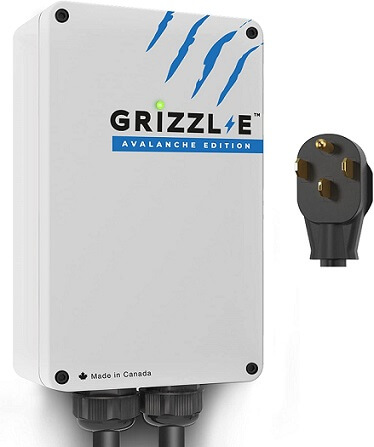
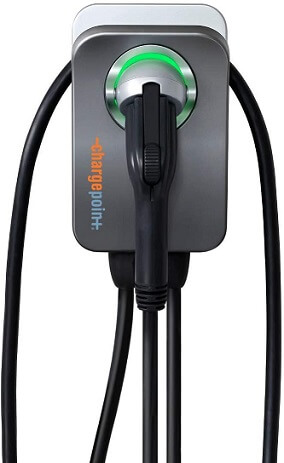
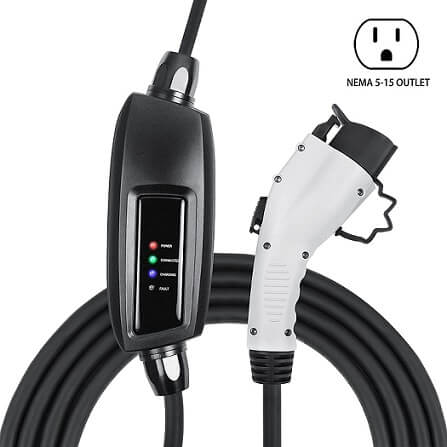
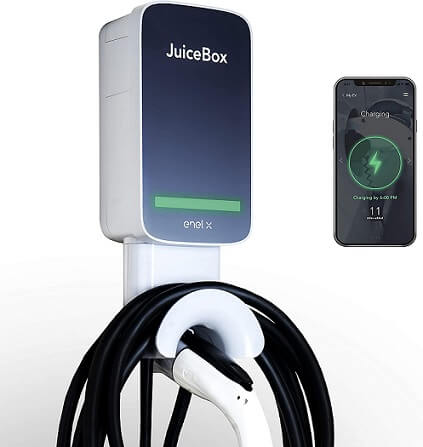
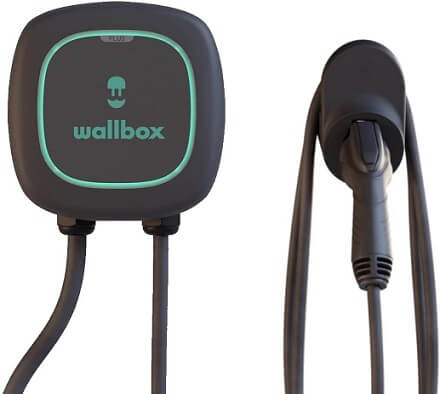
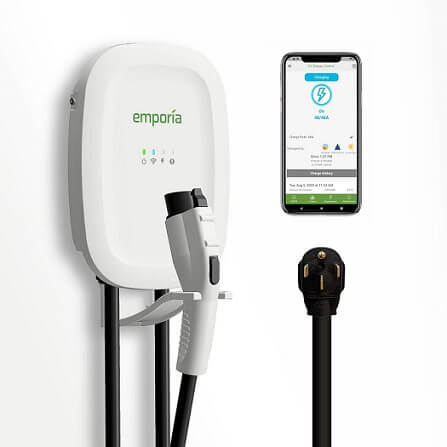
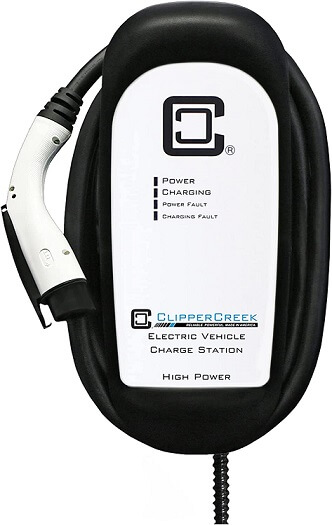
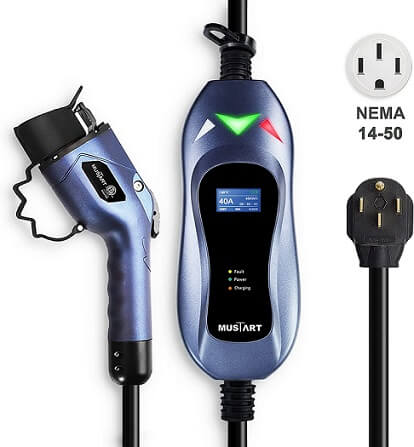
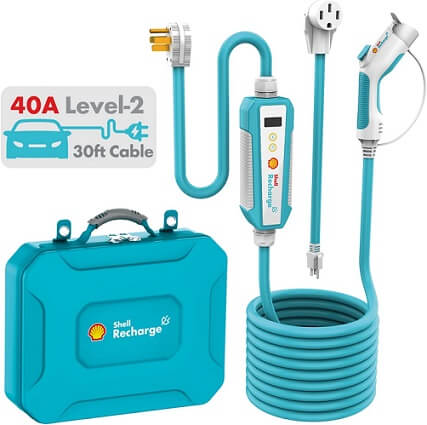


![]()